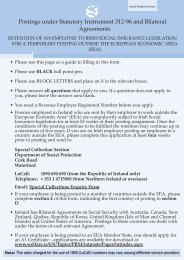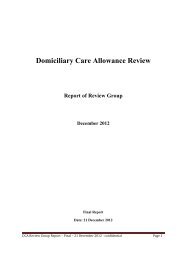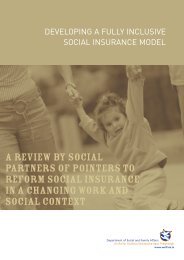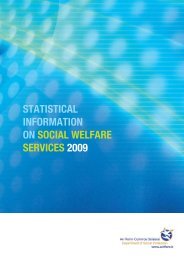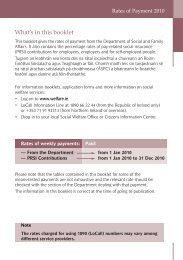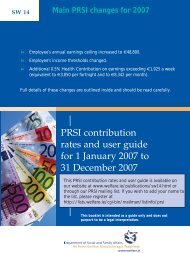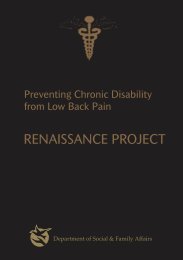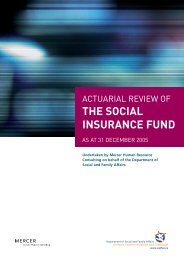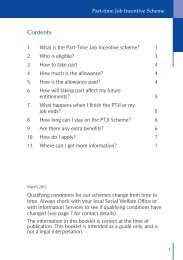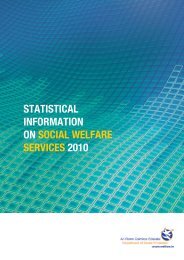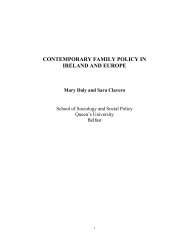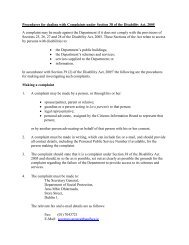department of social and family affairs annual report 2006 - Welfare.ie
department of social and family affairs annual report 2006 - Welfare.ie
department of social and family affairs annual report 2006 - Welfare.ie
Create successful ePaper yourself
Turn your PDF publications into a flip-book with our unique Google optimized e-Paper software.
<strong>2006</strong> in rev<strong>ie</strong>w<br />
<strong>2006</strong> - year in rev<strong>ie</strong>w<br />
> The context<br />
The Department’s work in <strong>2006</strong> was against a<br />
strong economic background. The Irish economy<br />
continued to perform well, with GNP growing<br />
by 4.2%. Population <strong>and</strong> employment continued<br />
to grow; the labour force rose to 2.108 million<br />
in <strong>2006</strong> (an increase <strong>of</strong> some 360,000 or 20% in<br />
the five years since 2001). As well as increased<br />
participation rates, this increase is attributable to<br />
increased numbers <strong>of</strong> immigrants, in particular<br />
people from the new EU member states.<br />
The Department’s polic<strong>ie</strong>s continued to be shaped<br />
in <strong>2006</strong> by the Social Partnership Agreement<br />
- Sustaining Progress - along with its successor<br />
agreement - Towards 2016 - which was published<br />
during the year.<br />
Key policy developments:<br />
> Towards 2016<br />
The new Social Partnership agreement - Towards<br />
2016 - which was produced in <strong>2006</strong> outlines a<br />
new framework within which the polic<strong>ie</strong>s <strong>and</strong><br />
programmes <strong>of</strong> the Department will be developed<br />
around the key challenges which the individual<br />
person faces <strong>and</strong> the supports which are available<br />
to them at each stage in the life cycle.<br />
A life cycle approach adopts the perspective <strong>of</strong><br />
the person, at whatever stage <strong>of</strong> the life cycle,<br />
as the centrep<strong>ie</strong>ce <strong>of</strong> <strong>social</strong> policy development<br />
<strong>and</strong> is intended to ensure that policy evolves in<br />
a manner which encompasses actions across<br />
relevant <strong>department</strong>s <strong>and</strong> agenc<strong>ie</strong>s in relation to<br />
the key life cycle stages represented by children,<br />
people <strong>of</strong> working age, older people <strong>and</strong> people<br />
with disabilit<strong>ie</strong>s.<br />
The lifecycle approach also <strong>of</strong>fers the potential <strong>of</strong><br />
a more streamlined, outcomes-focused approach<br />
to monitoring <strong>and</strong> <strong>report</strong>ing on progress within<br />
<strong>social</strong> partnership across key national strateg<strong>ie</strong>s<br />
<strong>and</strong> for improved availability <strong>and</strong> use <strong>of</strong> data.<br />
> Lone Parents<br />
A Government Discussion Paper, Proposals<br />
for Supporting Lone Parents, was published in<br />
February <strong>2006</strong> following a Report prepared by<br />
the Senior Officials Group on Social Inclusion. One<br />
<strong>of</strong> the main planks <strong>of</strong> policy aimed at reducing<br />
child poverty is to improve quality employment<br />
opportunit<strong>ie</strong>s for lone parents. Among the<br />
recommendations made were;<br />
- Reform <strong>of</strong> income supports<br />
- Exp<strong>and</strong>ed availability <strong>and</strong> range <strong>of</strong><br />
education <strong>and</strong> training opportunit<strong>ie</strong>s for<br />
lone parents<br />
- Extension <strong>of</strong> the National Employment<br />
Action Plan to also include lone parents<br />
- Focused provision <strong>of</strong> childcare<br />
- A targeted Teen Parent Support initiative<br />
- Improved information <strong>and</strong> advice services<br />
for lone parents.<br />
The development <strong>of</strong> a new <strong>social</strong> assistance<br />
payment <strong>and</strong> relevant legislation to replace the<br />
One Parent Family Payment is underway with<br />
the long term aim <strong>of</strong> assisting people to ach<strong>ie</strong>ve<br />
financial independence through supporting them<br />
to enter education, training <strong>and</strong> employment.<br />
> Early Childcare Supplement<br />
The Early Childcare Supplement was introduced in<br />
<strong>2006</strong>. This is a quarterly payment <strong>of</strong> €250 paid in<br />
respect <strong>of</strong> children under 6 who qualify for Child<br />
Benefit. The scheme is under the direction <strong>of</strong> the<br />
Office <strong>of</strong> the Minister for Children <strong>and</strong> paid by<br />
the DSFA Child Benefit Office. The first payments<br />
issued in August for the quarter April-June, with<br />
10



